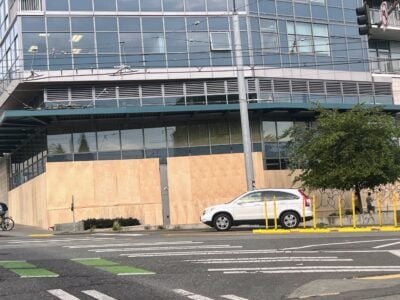Plywood at 1001 Broadway after the sudden closure of Whole Foods earlier this year (Image: CHS)
The Seattle City Council will vote Tuesday afternoon on the mayor’s plan to prohibit “negative use restrictions” as Seattle faces ongoing big chain grocery and pharmacy shutdowns.
The emergency legislation is skipping the council’s regular committee process as officials look to get in front of more closures.
CHS reported here on the proposal from Mayor Bruce Harrell that would “prohibit the use of restrictive or negative covenants preventing a property from being used as a grocery store or pharmacy” his administration says could be a growing problem as stores close.
The proposal comes amid an ongoing wave of closures including several major retail spaces around Capitol Hill.
On Capitol Hill where the 40,000-square-foot former Broadway Whole Foods has sat empty since its suden June closure, the building’s new owners say the Amazon-backed company holds a lease on the shuttered property through 2038. Meanwhile, the boarded 8,000-square-foot E Pike grocery formerly home to Amazon Fresh has remained empty since its equally abrupt April 2024 closure after four years of business on the block.
Broadway is also home to two large former chain drugstores that remain empty. The 15,000-square-foot Bartell Drugs above Broadway and Pike in the Harvard Market shopping center has been empty since late 2023. The 5,000-square-foot Broadway at E Olive Way Rite Aid in the one-time Broadway Theatre building has also been shuttered since the start of last year.
It is not clear what impact the legislation would have on those properties but, according to a city council analysis, the ban would not be enforced on agreements made before the ordinance goes into effect.
The council analysis also says the ban would not be invoked “when a grocery store or pharmacy owner or operator relocates to a location within one half-mile of the discontinued site, the new site opens within one year of the closure, and the negative use restriction does not exceed three years.”
The emergency legislation would establish a civil penalty of $1,500 per day for any violation.
A process to establish permanent legislation would follow.
The proposed legislation comes at a complicated time as the city council is focused on 2026 budget negotiations and both Council president Sara Nelson and Harrell are facing heated reelection battles.
Harrell’s competitor Katie Wilson has already won an important labor endorsement with the support of grocery workers union UFCW 3000 and has supported the idea of publicly backed grocery stores in Seattle.
While Harrell hasn’t addressed the idea, Harrell ally D3’s Joy Hollingsworth said she was not interested in city-run stores as her office pursues strategies to keep grocery stores open including tax breaks and incentive programs. In Seattle, the grocery chains are already exempt from the city’s JumpStart payroll tax on its largest employers.
With the planned closure of the Fred Meyer grocery store in Lake City this month, Harrell issued an executive order last week directing City Hall to “identify locations that are currently or may be at risk of becoming food deserts due to grocery store, convenience store, and pharmacy closures” and sort out “a potential City role in helping to acquire properties in strategic locations that may support a grocery store or pharmacy” in conjunction with private partnerships.
The order also directs the city to pursue “legislation to change land use, zoning, and permitting regulations to help incentivize more grocery stores and pharmacies in needed locations.”
 $5 A MONTH TO HELP KEEP CHS PAYWALL-FREE
$5 A MONTH TO HELP KEEP CHS PAYWALL-FREE
Subscribe to CHS to help us hire writers and photographers to cover the neighborhood. CHS is a pay what you can community news site with no required sign-in or paywall. To stay that way, we need you. Become a subscriber to help us cover the neighborhood for $5 a month — or choose your level of support 🖤




